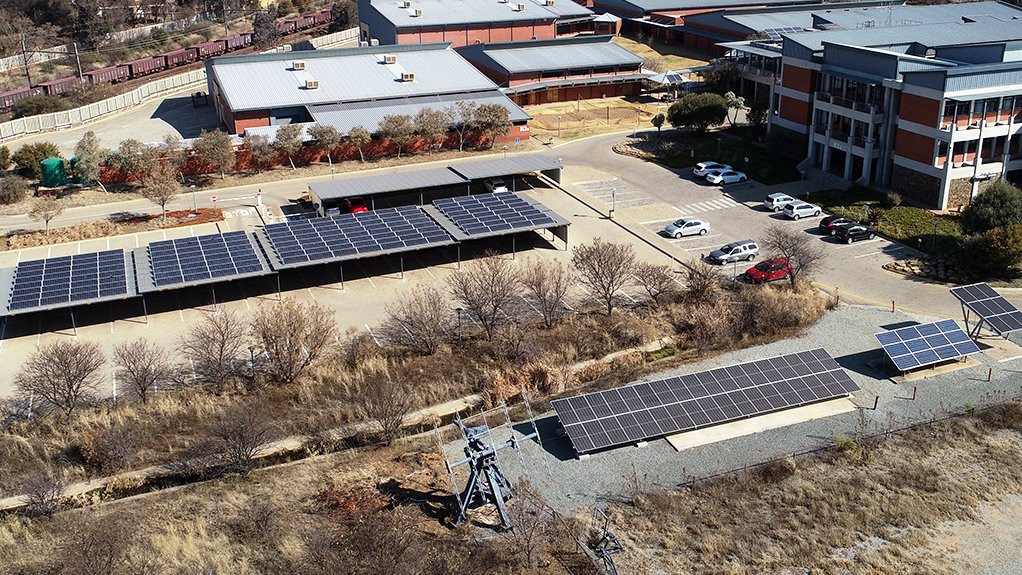JOHANNESBURG (miningweekly.com) – South Africa's North-West University (NWU) is investing around R35-million in strategic funding to advance green hydrogen research over the next five years.
This follows the announcement that Hydrogen South Africa Infrastructure Centre of Competence (HySA CoC) at NWU is collaborating with Japanese partners on a five-year international green hydrogen and green ammonia programme that addresses the sustainability issues developing countries face in providing practical research outcomes to benefit local and global societies.
An initial R14-million has been allocated into green hydrogen research through water electrolysis and green ammonia for 2022 and 2023 with an additional R21-million earmarked for the years 2024 to 2026. Green hydrogen is produced by splitting water into hydrogen and oxygen using clean renewable electricity.
"The strategic funding investment is crucial for the NWU to deliver on this profound mandate," NWU deputy vice-chancellor for research and innovation Professor Jeffrey Mphahlele stated in a media release to Engineering News & Mining Weekly.
Hydrogen technologies have a special meaning for South Africa as most of the platinum group metals that are needed for the related hydrogen technologies such as water electrolysis and fuel cells are mined in South Africa.
Moreover, South Africa offers excellent sources of renewable energy, with electrolytic green hydrogen generation also being one of the cornerstones of the activities mentioned in South Africa’s Hydrogen Society Roadmap.
Focusing mainly on the production of green hydrogen using renewable energy and advanced water electrolysis, NWU is partnering the Science and Technology Research Partnership for Sustainable Development (SATREPS), a collaboration platform between two Japanese government agencies – the Japan Science and Technology Agency and the Japan International Cooperation Agency.
The South African partner within the SATREPS green hydrogen and ammonia project is Japan’s National Institute of Technology, Numazu College for technical collaboration in green ammonia, knowledge sharing and student exchange.
The South Africa Department of Science and Innovation is a co-funder of the SATREPS project through HySA CoC at NWU.
Chemicals and energy company Sasol, being a leader in hydrogen production in South Africa, will also be contributing their technical expertise. Sasol this week announced the signing of a long-term contract for the supply of 69 MW of renewable energy to its Sasolburg site in the Free State, which is the first of several upcoming agreements to secure the renewable energy supply required to produce green hydrogen.
"The main focus of the research is the developing advanced high-efficiency water electrolysis technology and related components such as stacks and catalyst coated membranes – CCMs – that will be manufactured locally to be integrated with advanced low-pressure Haber-Bosch reactors for green ammonia production,” NWU engineering faculty executive dean Professor Liezl Van Dyk explained.
Facilitating the new partnership is the signing of a memorandum of understanding (MoU) by the two institutions, which kicked off the first meeting in November last year.
The MoU provides guidelines for the research activities that will be undertaken to assist South Africa's efforts to develop capacities and expertise with focus on electrolysis and green ammonia development.
There is an increased recognition and awareness that the conversion of electrical energy to storable chemicals and fuels is an inevitable part of the green transition from a fossil-based to a sustainable energy system.
“The international partnership is one of the keys for success in the area of highly competitive hydrogen technologies,” HySA CoC at NWU and CSIR Professor Dmitri Bessarabov stated in the same release.
“When produced, hydrogen has to be used on site or delivered to the point of use, for the very large quantities of hydrogen to be transported, ammonia, as a chemical derivative of hydrogen is the best option,” Bessarabov added.
Internationally, hydrogen is seen not only as an industrial gas, that is already in production to the level of about 85-million to 90-mlillion tonnes a year, but also as an enabler of decarbonisation and energy storage.
The transition to green hydrogen can be a hugely beneficial reality in the near future with collaboration between companies, countries and knowledge institutions, Higher Education, Science and Innovation Minister Blade Nzimande told a just energy transition event attended by European Commission Joint Research Centre director-general Stephen Quest, UK high commissioner Antony Phillipson and representatives of neighbouring African States.
“If we indeed work together, we can speed up the energy transition and make the green hydrogen economy a reality in the near future,” said Nzimande, whose Ministry has been at the forefront of exploring ways in which South Africa can play a significant role in the green hydrogen economy.
EMAIL THIS ARTICLE SAVE THIS ARTICLE ARTICLE ENQUIRY
To subscribe email subscriptions@creamermedia.co.za or click here
To advertise email advertising@creamermedia.co.za or click here











